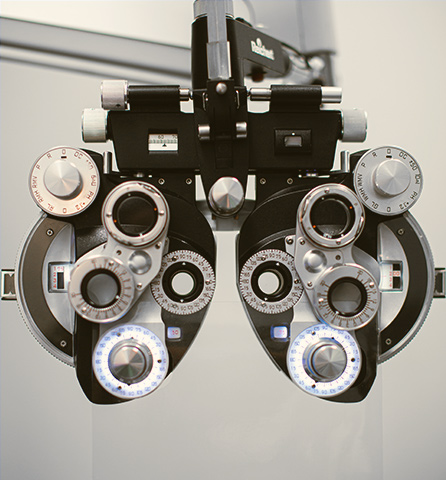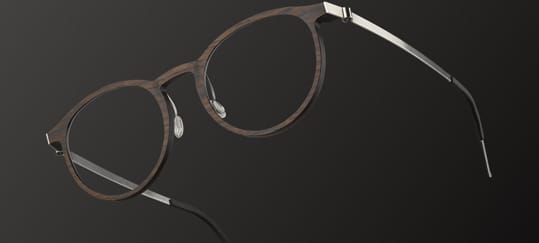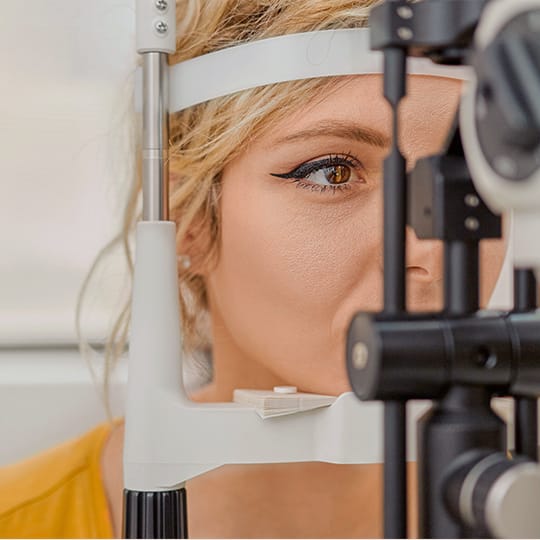Keep Watch on Your Sight
An eye exam can do so much more than find your prescription. It can set a baseline for vision changes and help you keep your vision better, longer. The earlier problems are found, the earlier they can be treated.
Regular eye exams can even spot other health conditions, such as cancer and diabetes, that may be missed until more obvious symptoms appear. Visit your optometrist at Calgary Optometry Centre for regular care.


Keep Up with Regularly Scheduled Eye Exams
Staying on top of your eye health is beneficial. The Canadian Association of Optometrists recommends that adults between 20-64 should have their eyes examined by a professional every 2 years.
Of course, this is only a guideline. If there is any evidence of an eye disease or condition, we may want to see you more regularly to ensure you get the best care. Chat with your optometrist about the care plan and appointment schedule that’s best for you!
A Note on Senior Eye Exams
Ageing can increase our risk of vision problems. By age 65, 1 in 9 Canadians develop irreversible vision loss, and by age 75, this increases to 1 in 4. Early detection of problems can help combat vision loss.
Because of this increased risk, the Canadian Association of Optometrists recommends seniors have annual eye exams.
If you’re over 65, Alberta Health Care covers the cost of your annual eye exam. Visit yearly to help us take the best possible care of your sight.
Cutting-Edge Optical Technology
The field of optometry is constantly advancing. In the 35 years we’ve been in practice, we’ve made it our mission to keep learning so we remain at the forefront of our field. Our commitment to our patients requires continuous education to keep our knowledge current and staying up-to-date with the latest innovations—something we’re happy to do for you!
You can expect our optometry practices to use the latest in diagnostic imaging and testing equipment.
What to Expect from Your Exam
Pre-Exam
Before you meet with one of our optometrists, you will undergo some preliminary testing by an optometric assistant. These tests are fast and non-invasive and are used to help guide the tests performed by the optometrist.
These tests include:
- Optomap retinal imaging: A high-resolution, wide-field digital retinal camera. This technology takes detailed images of your internal eye structures (retina, macula, etc.). Eye diseases like glaucoma and macular degeneration are both clearly visible via this process.
- Ocular coherence tomography (OCT): Similar to retinal imaging but using in process, OCT imaging creates highly detailed, 3D images of the back of your eye. We pay particular attention to your optic nerve and macula, both of which are vulnerable to damage from eye diseases like glaucoma or macular degeneration.
- Visual field testing: This process assesses your peripheral vision. Certain eye diseases, such as glaucoma, impact your peripheral vision before your central vision is affected. Visual field testing can provide an early clue about developing eye diseases.
- Autorefractor: This test quickly approximates what corrective lens prescription, if any, is needed for your eyes. The optometrist uses this information to quickly hone in on your ideal prescription.
- Tonometer: This test measures your intraocular pressure (IOP). An abnormal IOP is often an indicator of certain eye diseases, including (you guessed it) glaucoma.
With the Optometrist
After the preliminary testing is complete, you will meet with an optometrist for more testing and discuss your concerns.
The optometrist will:
- Gather information about your vision and eye health concerns. They’ll also update your general health and medication information as both of these factors may affect your vision and eye health.
- Perform a visual examination of your internal and external eye structure. Your eyes not only provide information about your ocular health, they often give a good indication of overall health. We assess yours during the exam to ensure everything looks as it should.
- Perform a visual acuity test and refine your prescription. If your vision would benefit from a corrective lens prescription, the optometrist will fine-tune your prescription to meet your specific requirements.
- Perform a binocular vision assessment. The eyes are meant to work as a team. Various testing is done to ensure your eyes are aligned, tracking, and focusing together.
- Do a digital imaging assessment. The optometrist will review the images captured by the retinal camera and OCT, outlining any changes or concerns they have.
The optometrist may perform other tests as needed, including dilation.
Following the Exam
After your exam is finished, our thorough optometrists will discuss their results with you. Your treatment plan will be laid out, and we’ll answer any questions that may come up.
If you need corrective lenses, we can schedule a contact lens exam or leave you in the capable hands of our team to peruse our frames gallery.
Our Eye Care Offerings
Calgary Optometry Centre is here to serve your eye health. We pride ourselves on offering excellent vision care for every member of your family. Allow us to share our optical knowledge and make your family’s vision our number 1 priority. Visit for an exam soon!
Serving Calgarians at 3 locations
Calgary Downtown
- 403-264-2639
- 403-264-2872
- dt@calgaryoptometry.com
- Suite 110, 840 7 Avenue SW
- Calgary, Alberta T2P 3G2
Office Hours
- Monday: 8:00 AM – 4:30 PM
- Tuesday: 8:00 AM – 4:30 PM
- Wednesday: 8:00 AM – 4:30 PM
- Thursday: 8:00 AM – 4:30 PM
- Friday: 8:00 AM – 4:30 PM
- Saturday: Closed
- Sunday: Closed
Lake Bonavista
- 403-278-8851
- 403-271-5139
- bv@calgaryoptometry.com
- #630, 12100 Macleod Trail SE
- Calgary, Alberta T2J 7G9
*The office is closed between 12:00 pm and 1:00 pm Mondays to Fridays.
Office Hours
- Monday: 8:30 AM – 5:00 PM
- Tuesday: 8:30 AM – 5:00 PM
- Wednesday: 8:30 AM – 5:00 PM
- Thursday: 8:30 AM – 7:00 PM
- Friday: 8:30 AM – 5:00 PM
- Saturday: 8:00 AM – 2:00 PM
- Sunday: Closed
Huntington Hills
- 403-274-5234
- 403-274-1674
- hh@calgaryoptometry.com
- 6530 4 Street NE
- Calgary , Alberta T2K 6H2
*The office is closed between 12:00 pm and 1:00 pm Mondays to Fridays.
Office Hours
- Monday: 8:30 AM – 5:00 PM
- Tuesday: 8:30 AM – 7:00 PM
- Wednesday: 8:30 AM – 5:00 PM
- Thursday: 8:30 AM – 5:00 PM
- Friday: 8:30 AM – 5:00 PM
- Saturday: 8:00 AM – 2:00 PM
- Sunday: Closed

EXPLORE OUR SERVICES
Our Brands








Our Google Reviews


Our Blog
Winter Eye Care: Dealing with Calgary’s Dry Indoor Air
Dry EyeYou step inside from Calgary’s frigid winter air, and within minutes your eyes start feeling scratchy and irritated. The warm indoor heat that protects you from the cold also strips moisture from the air, and from your eyes. Calgary Optometry Centre sees many families dealing with this seasonal challenge, especially as Calgary’s winter months create […]
Can Myopia Be Reversed?
Eye ConditionsYou’ve noticed your child squinting at the TV or holding books closer to their face. Maybe they’ve complained about not being able to see the board at school clearly. As a parent, you naturally wonder if there’s a way to fix this vision problem permanently. Calgary Optometry Centre understands these concerns and helps families navigate […]
What Is IPL Treatment for Dry Eyes?
Dry EyeIf you’ve been dealing with scratchy, burning eyes that make daily activities uncomfortable, you’re not alone. Many families struggle with dry eye symptoms that can affect everything from reading bedtime stories to driving safely at night. Understanding what causes dry eye can help you explore effective treatment options, and scheduling how long does an eye […]
Winter Eye Care: Dealing with Calgary’s Dry Indoor Air

You step inside from Calgary’s frigid winter air, and within minutes your eyes start feeling scratchy and irritated. The warm indoor heat that protects you from the cold also strips moisture from the air, and from your eyes. Calgary Optometry Centre sees many families dealing with this seasonal challenge, especially as Calgary’s winter months create […]
Can Myopia Be Reversed?

You’ve noticed your child squinting at the TV or holding books closer to their face. Maybe they’ve complained about not being able to see the board at school clearly. As a parent, you naturally wonder if there’s a way to fix this vision problem permanently. Calgary Optometry Centre understands these concerns and helps families navigate […]
What Is IPL Treatment for Dry Eyes?

If you’ve been dealing with scratchy, burning eyes that make daily activities uncomfortable, you’re not alone. Many families struggle with dry eye symptoms that can affect everything from reading bedtime stories to driving safely at night. Understanding what causes dry eye can help you explore effective treatment options, and scheduling how long does an eye […]







